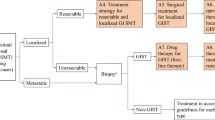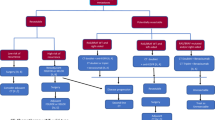Abstract
Background
Patients undergoing imatinib therapy for gastrointestinal stromal tumors (GISTs) show drug resistance during treatment in the late stages. The aims of this study were to determine survival after the appearance of imatinib secondary resistance (ISR) and to identify the prognostic factors.
Methods
Eligible were patients with unresectable and metastatic GISTs who were diagnosed with ISR and/or underwent treatment for ISR in our institution between 2001 and 2012. A total of 48 patients were enrolled and overall survival was retrospectively analyzed. The Cox proportional hazards model was used to identify the independent prognostic factors. Median follow-up time was 58 months.
Results
As of the cutoff date, 41 of the 48 patients with ISR had died, of which 39 died of GISTs. The overall 1-, 3-, and 5-year survival rates of the 48 patients were 64.6, 32.8, and 20.4 %, respectively, and median survival time was 22 months. The favorable independent prognostic factors identified were long progression-free survival in first-line imatinib therapy (P = 0.04), small diameter of progressive disease (PD) (P = 0.02), and surgical resection of PD (P = 0.01).
Conclusion
Surgical resection of PD in selected cases could improve prognosis in ISR patients undergoing GIST treatment.


Similar content being viewed by others
Abbreviations
- BSC:
-
Best supportive care
- CT:
-
Computed tomography
- GIST:
-
Gastrointestinal stromal tumor
- ISR:
-
Imatinib secondary resistance
- IVR:
-
Interventional radiology
- MST:
-
Median survival time
- OS:
-
Overall survival
- PD:
-
Progressive disease
- PDGFRA:
-
Platelet-derived growth factor receptor alpha
- PFS:
-
Progression-free survival
- RECIST:
-
Response Evaluation Criteria in Solid Tumors
- RFA:
-
Radiofrequency ablation
- SD:
-
Stable disease
- TACE:
-
Transcatheter arterial chemoembolization
- TKI:
-
Tyrosine kinase inhibitor
References
Demetri GD, von Mehren M, Antonescu CR et al (2010) NCCN Task Force report: update on the management of patients with gastrointestinal stromal tumors. J Natl Compr Cancer Netw 8(suppl 2):S1–S41
The ESMO/European Sarcoma Network Working Group (2014) Gastrointestinal stromal tumours: ESMO clinical practice guidelines for diagnosis, treatment and follow-up. Ann Oncol 25(suppl 3):iii21–iii26
Nishida T, Hirota S, Yanagisawa A et al (2008) Clinical practice guidelines for gastrointestinal stromal tumor (GIST) in Japan: English version. Int J Clin Oncol 13:416–430
Blanke CD, Demetri GD, von Mehren M et al (2008) Long-term results from a randomized phase II trial of standard- versus higher-dose imatinib mesylate for patients with unresectable or metastatic gastrointestinal stromal tumors expressing KIT. J Clin Oncol 26:620–625
Kanda T, Ishikawa T, Hirota S et al (2012) Prospective observational study of imatinib therapy in Japanese patients with advanced gastrointestinal stromal tumors: long-term follow-up and second malignancy. Jpn J Clin Oncol 42:578–585
Ogata K, Mochiki E, Ojima H et al (2014) A multicenter long-term study of imatinib treatment for Japanese patients with unresectable or recurrent gastrointestinal stromal tumors. J Surg Oncol 110:942–946
Demetri GD, van Oosterom AT, Garrett CR et al (2006) Efficacy and safety of sunitinib in patients with advanced gastrointestinal stromal tumour after failure of imatinib: a randomised controlled trial. Lancet 368:1329–1338
Demetri GD, Reichardt P, Kang YK et al (2013) Efficacy and safety of regorafenib for advanced gastrointestinal stromal tumours after failure of imatinib and sunitinib (GRID): an international, multicentre, randomised, placebo-controlled, phase 3 trial. Lancet 381:295–302
Rutkowski P, Nowecki Z, Nyckowski P (2006) Surgical treatment of patients with initially inoperable and/or metastatic gastrointestinal stromal tumors (GIST) during therapy with imatinib mesylate. J Surg Oncol 93:304–311
Raut CP, Posner M, Desai J et al (2006) Surgical management of advanced gastrointestinal stromal tumors after treatment with targeted systemic therapy using kinase inhibitors. J Clin Oncol 24:2325–2331
DeMatteo RP, Maki RG, Singer S et al (2007) Results of tyrosine kinase inhibitor therapy followed by surgical resection for metastatic gastrointestinal stromal tumor. Ann Surg 245:347–352
Kobayashi K, Gupta S, Trent JC et al (2006) Hepatic artery chemoembolization for 110 gastrointestinal stromal tumors: response, survival, and prognostic factors. Cancer 107:2833–2841
Takaki H, Litchman T, Covey A et al (2014) Hepatic artery embolization for liver metastasis of gastrointestinal stromal tumor following imatinib and sunitinib therapy. J Gastrointest Cancer 45:494–499
Shankar S, vanSonnenberg E, Desai J et al (2005) Gastrointestinal stromal tumor: new nodule-within-a-mass pattern of recurrence after partial response to imatinib mesylate. Radiology 235:892–898
Desai J, Shankar S, Heinrich MC et al (2007) Clonal evolution of resistance to imatinib in patients with metastatic gastrointestinal stromal tumors. Clin Cancer Res 13:5398–5405
Liegl B, Kepten I, Le C et al (2008) Heterogeneity of kinase inhibitor resistance mechanisms in GIST. J Pathol 216:64–74
Therasse P, Arbuck SG, Eisenhauer EA et al (2000) New guidelines to evaluate the response to treatment in solid tumors. European Organization for Research and Treatment of Cancer, National Cancer Institute of the United States, National Cancer Institute of Canada. J Natl Cancer Inst 92:205–216
Debiec-Rychter M, Sciot R, Le Cesne A et al (2006) KIT mutations and dose selection for imatinib in patients with advanced gastrointestinal stromal tumours. Eur J Cancer 42:1093–1103
Wakai T, Kanda T, Hirota S et al (2004) Late resistance to imatinib therapy in a metastatic gastrointestinal stromal tumour is associated with a second KIT mutation. Br J Cancer 90:2059–2061
Heinrich MC, Corless CL, Blanke CD et al (2006) Molecular correlates of imatinib resistance in gastrointestinal stromal tumors. J Clin Oncol 24:4764–4774
Reichardt P, Kang YK, Rutkowski P et al (2015) Clinical outcomes of patients with advanced gastrointestinal stromal tumors: safety and efficacy in a worldwide treatment-use trial of sunitinib. Cancer 121:1405–1413
Mudan SS, Conlon KC, Woodruff JM et al (2000) Salvage surgery for patients with recurrent gastrointestinal sarcoma: prognostic factors to guide patient selection. Cancer 88:66–74
Hasegawa J, Kanda T, Hirota S et al (2007) Surgical interventions for focal progression of advanced gastrointestinal stromal tumors during imatinib therapy. Int J Clin Oncol 12:212–217
Acknowledgments
This study was supported in part by a Grant-in-Aid for Scientific Research from the Japan Society for Promotion of Science (No. 24591934). The authors are grateful to Professor Kohei Akazawa, Niigata University Graduate School of Medical and Dental Sciences, for helpful advice on statistical analysis.
Author information
Authors and Affiliations
Corresponding author
Ethics declarations
Conflict of interest
Seiichi Hirota received lecture fees from Novartis. Tatsuo Kanda, Takashi Ishikawa, Shin-ichi Kosugi, Kyo Ueki, Tetsuya Naito, and Toshifumi Wakai have no conflict of interest.
About this article
Cite this article
Kanda, T., Ishikawa, T., Kosugi, Si. et al. Prognostic factors after imatinib secondary resistance: survival analysis in patients with unresectable and metastatic gastrointestinal stromal tumors. Int J Clin Oncol 21, 295–301 (2016). https://doi.org/10.1007/s10147-015-0903-7
Received:
Accepted:
Published:
Issue Date:
DOI: https://doi.org/10.1007/s10147-015-0903-7




